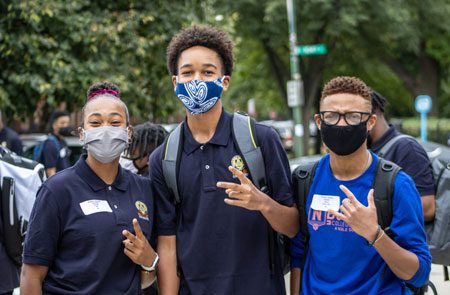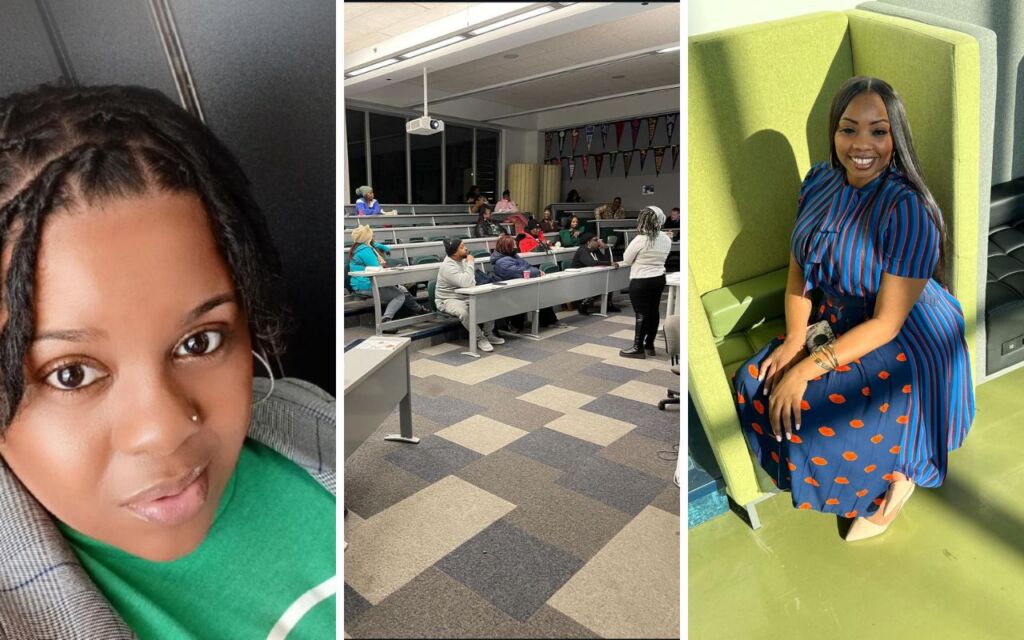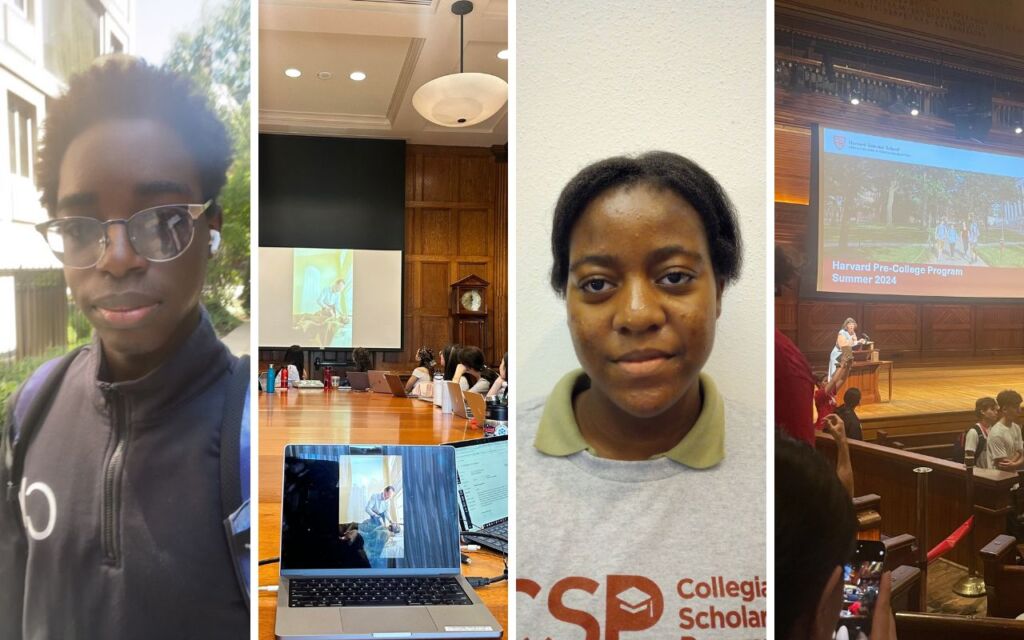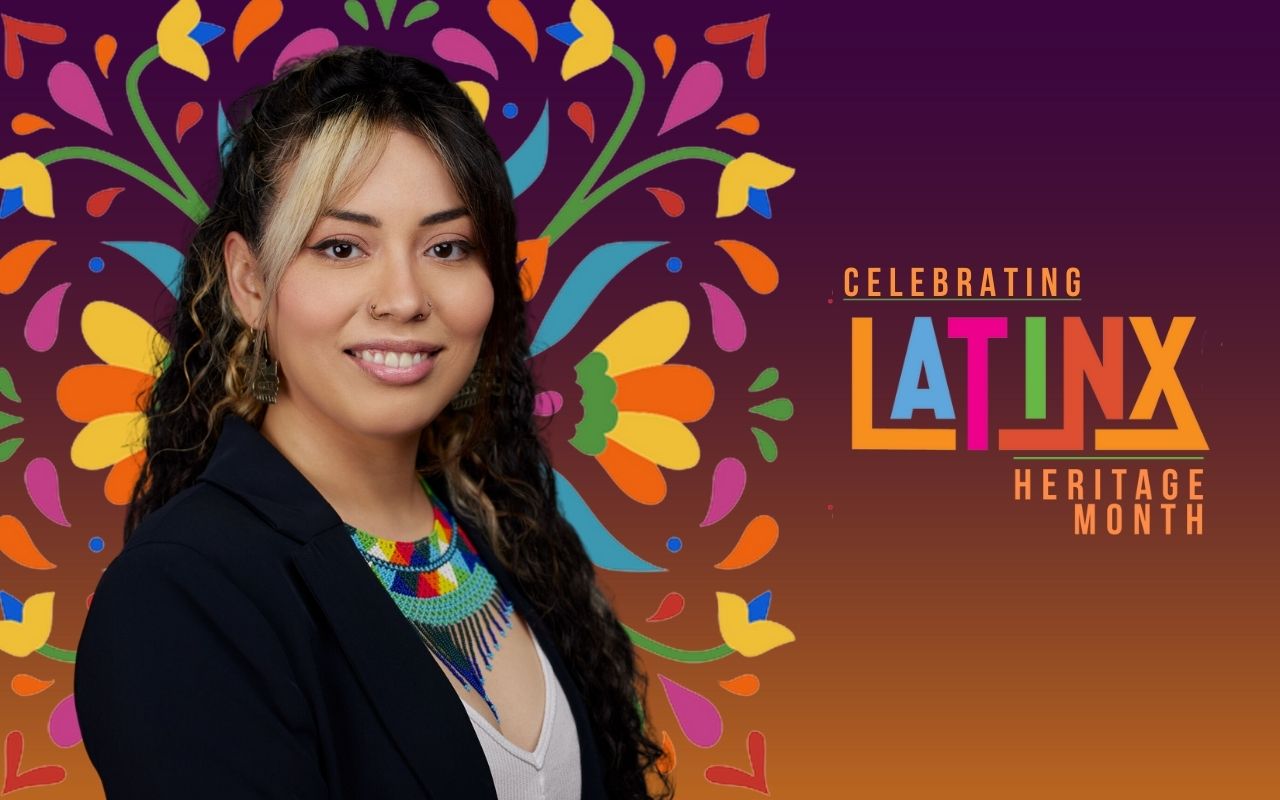
This is part of a series of writings from Noble staff that celebrate heritage and history. This piece is written to celebrate Latinx Heritage Month. You can read more here about why Noble Schools chooses to use the word “Latinx”.
BY LAURA RODRIGUEZ | she/her
Alumni Success Coach, Noble Support Team
As agents of change at Noble, we are committed to anti-racism as we strive to create equitable student experiences and outcomes, regardless of race, gender, ability, sexual orientation, class, or any other identity marker. Reflecting on what Latinx/e Heritage Month means to me, I automatically get taken back to my ancestors, the Mexicas. The Mexica were late-comers to the Valley of Mexico, and they are known for founding the city-state of Tenochtitlan on unpromising islets in Lago Texcoco. The Mexica later became the dominant power of the Aztec Triple Alliance or Aztec Empire. The Mexica are Nahuatl-speaking people of the Valley of Mexico, where my Mother was born.
It has been empowering to learn that my ancestors were healers, intellectuals who created calendar systems, the concept of zero, astronomers, farmers of corn, beans, and squash. My ancestors were chiefs, leaders, and problem solvers. They were intricate, social, political, and created religious and commercial organizations. They are like today’s descendants of the Mexicas who diligently rise with the sun and labor. My people demonstrate their commitment to their families and communities.
Contrary to my colonizers’ beliefs, they were not savages, uneducated, or dangerous. They are not drug traffickers, criminals, violent, or gang members. As I continue to point out and fight these very harmful stereotypes and learn about where we came from and who we really are, I vow and commit to forever be proud of who I am and where I come from. I am a proud Latina and will unapologetically continue to be my authentic self in all spaces. I refuse to assimilate into standards that are not mine.
Today, I know that I speak the language of my oppressor (English) and the language of my colonizer (Spanish). Today, I know that conquistadors or conquistadores did NOT conquer my ancestors, they were indeed brutalized and colonized. Personally, this has challenged me to explore more about my native and indigenous history, especially in a world where DEI efforts, book bans, and ethnic studies continue to be banned.
As I continue to educate myself and others on my cultura, I must acknowledge that it feels like omitting this history from the curriculum has been intentional. Still today, my history is being taught as an elective. And so I challenge us to disrupt the norm, the status quo and get in good trouble as we think about ways to intentionally include Latinx/e culture within our classroom, within our lessons, within the art in the hallways. I challenge us to really step into being pioneers of change and create ways to make sure all of our students feel safe and affirmed through culture.
Together we can shape the future. I urge you to be intentional with your pedagogy. I urge you to create culturally relevant content for our kids -on the daily, NOT only during Latinx/e Heritage Month. As an Educator, I urge you to create spaces for our kids to discuss the contributions of Mexican Americans and Latinx folks to this country. To create safe spaces where our kids can learn and explore their history and identities. Let’s continue to bring up the past and elements of the present during uncertain times. This is a month to focus on the beauty of such a vibrant, diverse, and communal culture. Whether it be through food, games, dancing, or personal identities. There is JOY in being Latinx/e. Let us shift attention to what it means to be Latinx/e and how having this identity is like winning the lottery.
POR LAURA RODRIGUEZ | she/her/ella
Alumni Success Coach, Noble Support Team
Como agentes de cambio en Noble, estamos comprometidos con el antirracismo, ya que nos esforzamos por crear experiencias y resultados equitativos para los estudiantes, independientemente de su raza, género, capacidad, orientación sexual, clase o cualquier otro marcador de identidad. Al reflexionar sobre lo que significa para mí el Mes de la Herencia Latinx/e, automáticamente me remito a mis antepasados, los mexicas. Los mexicas llegaron tarde al Valle de México y se les conoce por fundar la ciudad-estado de Tenochtitlan en unos islotes poco prometedores del Lago Texcoco. Más tarde, los mexicas se convirtieron en la potencia dominante de la Triple Alianza Azteca o Imperio Azteca. Los mexicas son pueblos de habla náhuatl del Valle de México, donde nació mi madre.
Ha sido fortalecedor saber que mis antepasados fueron curanderos, intelectuales que crearon sistemas calendáricos, el concepto del cero, astrónomos, agricultores de maíz, frijoles y calabaza. Mis antepasados fueron jefes, líderes y solucionadores de problemas. Eran intrincados, sociales, políticos y crearon organizaciones religiosas y comerciales. Son como los descendientes actuales de los mexicas que se levantan diligentemente con el sol y trabajan. Mi pueblo demuestra su compromiso con sus familias y comunidades.
Contrariamente a las creencias de mis colonizadores, no eran salvajes, incultos ni peligrosos. No son narcotraficantes, delincuentes, violentos ni miembros de bandas. Mientras continúo señalando y luchando contra estos estereotipos tan dañinos y aprendiendo de dónde venimos y quiénes somos realmente, juro y me comprometo a estar siempre orgullosa de quién soy y de dónde vengo. Soy una latina orgullosa y seguiré siendo mi yo auténtica en todos los espacios. Me niego a asimilar estándares que no son los míos.
Hoy sé que hablo el idioma de mi opresor (inglés) y el idioma de mi colonizador (español). Hoy sé que los conquistadores NO conquistaron a mis antepasados, sino que fueron brutalizados y colonizados. Personalmente, esto me ha desafiado a explorar más sobre mi historia nativa e indígena, especialmente en un mundo donde los esfuerzos de DEI, las prohibiciones de libros y los estudios étnicos continúan siendo prohibidos.
Mientras continúo educándome y educando a otros sobre mi cultura, debo reconocer que parece que la omisión de esta historia en el currículo ha sido intencionada. Todavía hoy, mi historia se enseña como asignatura optativa. Así que nos reto a romper la norma, el status quo y a meternos en problemas cuando pensamos en maneras de incluir intencionadamente la cultura Latinx/e en nuestras clases, en nuestras lecciones, en el arte de los pasillos. Nos reto a ser pioneros del cambio y a crear formas de asegurarnos de que todos nuestros estudiantes se sientan seguros y afirmados a través de la cultura.
Juntos podemos dar forma al futuro. Les insto a que sean intencionados con su pedagogía. Los insto a crear contenido culturalmente relevante para nuestros niños – a diario, NO sólo durante el Mes de la Herencia Latinx/e. Como educador, le insto a crear espacios para que nuestros niños discutan las contribuciones de los mexicano-americanos y latinos a este país. Crear espacios seguros donde nuestros niños puedan aprender y explorar su historia e identidades. Sigamos trayendo a colación el pasado y los elementos del presente en tiempos de incertidumbre. Este es un mes para centrarnos en la belleza de una cultura tan vibrante, diversa y comunitaria. Ya sea a través de la comida, los juegos, el baile o las identidades personales. Hay ALEGRÍA en ser Latinx/e. Prestemos atención a lo que significa ser Latinx/e y cómo tener esta identidad es como ganar la lotería.
BY LAURA RODRIGUEZ | she/her
Alumni Success Coach, Noble Support Team
作为贵族学校的变革推动者,我们致力于反种族主义,
了解到我的祖先是治疗师、创造了历法系统和零概念的知识分子、
与殖民者的想法相反,他们并不是野蛮人,没有受过教育,
今天,我知道我说的是压迫者的语言(英语)和殖民者的语言(
在我继续教育自己和他人了解我的文化时,我必须承认,
我们可以共同塑造未来。我敦促你们有意识地使用你们的教学法。

